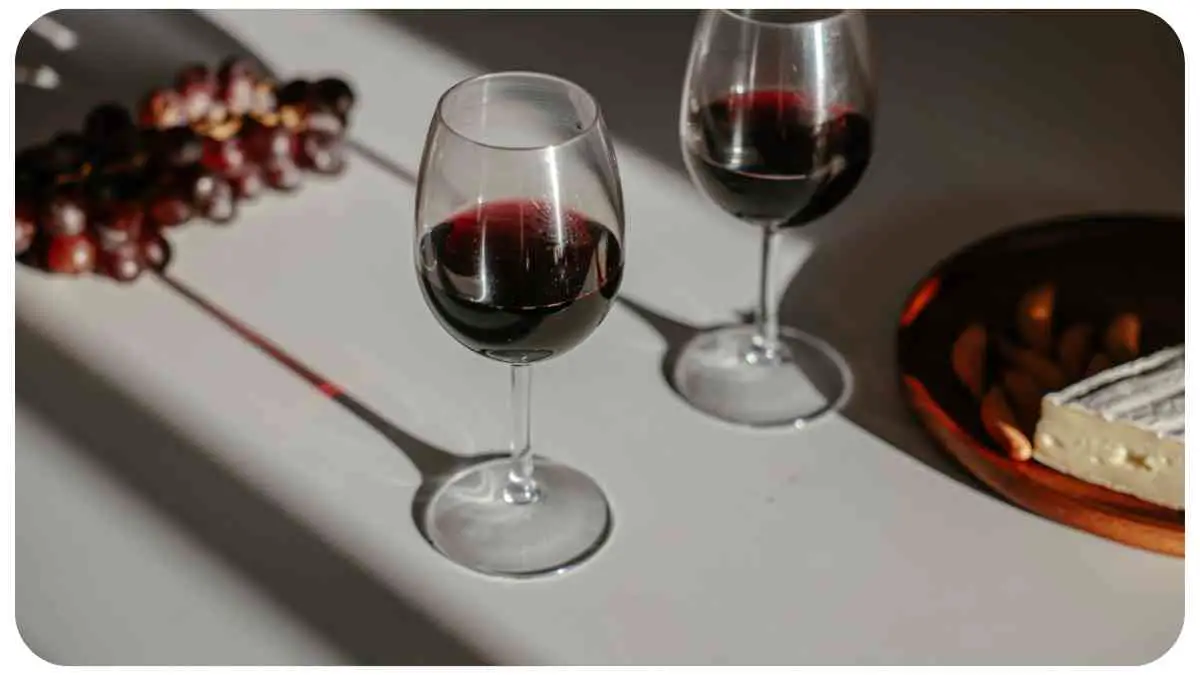Welcome to a comprehensive guide on vegan wine! Whether you’re new to veganism or just interested in exploring vegan-friendly options, understanding the basics of vegan wine is essential. In this article, we’ll delve into the principles behind vegan winemaking, discover common non-vegan ingredients found in wine, explore vegan wine certification, and much more.
Along the way, we’ll provide personal insights and industry expertise to ensure you have a thorough understanding of this fascinating topic.
| Key Takeaways from “A Guide to Vegan Wine” |
|---|
| Vegan wine can be produced using alternative fining agents and filtration methods. |
| Popular vegan wine brands include Frey Vineyards, Bonterra Vineyards, The Vegan Vine, and Cooper’s Hawk. |
| Pairing vegan wine with food can enhance the dining experience. Light white wines pair well with salads and sushi, while full-bodied red wines complement hearty vegan dishes. |
| Choosing vegan wine contributes to a more sustainable future by reducing carbon footprint, preserving biodiversity, conserving water, and minimizing environmental contamination. |
| Understanding the rise of vegan wine highlights changing consumer preferences, health considerations, industry innovation, and increased education and awareness. |
| Additional resources, such as the Vegan Wine Guide by Wine Insiders, the WSET Global Blog, and Virgin Wines UK, provide further information on vegan wine. |
| FAQs address common questions about organic wines, identifying vegan wine, potential taste differences, price comparisons, and aging vegan wine. |
2. What Makes a Wine Vegan?

Vegan wine is an increasingly popular choice for many individuals due to ethical, health, or environmental reasons. Unlike traditional wine, vegan wine is produced without the use of animal-derived ingredients or processes.
Instead, vegan winemakers employ alternative methods to clarify and stabilize their wines. It’s crucial to note that vegan wine can offer a similar taste and quality as non-vegan wine, making it a viable option for wine enthusiasts of all preferences.
Did you know that the environmental impact of a vegan diet can be shocking? Explore how your food choices affect the planet and learn how you can make a difference. Find out more in The Environmental Impact of a Vegan Diet: You’ll Be Shocked – a comprehensive guide.
3. Understanding Vegan Wine Certification
To help consumers identify vegan wine options, various certification organizations have emerged. These certifications ensure that the winemaking process aligns with vegan principles.
One notable certification is the Certified Vegan logo, which guarantees that the wine is free from any animal products. By choosing certified vegan wine, you can have peace of mind knowing that your purchase reflects your values and supports cruelty-free production.
4. The Impact of Non-Vegan Ingredients
Non-vegan ingredients in wine can have significant implications for individuals adhering to a plant-based lifestyle. Surprisingly, many wines contain substances such as egg whites, fish bladder, or gelatin, which are used for fining or clarifying purposes.
These animal-derived ingredients can act as allergens, rendering the wine unsuitable for individuals with specific dietary restrictions. By opting for vegan wine, you can enjoy your favorite beverage without compromising your ethical or dietary choices.
Discover the science-backed evidence behind the health benefits of a vegan diet. From improved heart health to increased longevity, this guide explains it all. Uncover the secrets in The Health Benefits of a Vegan Diet: The Science Behind It All.
5. Common Non-Vegan Ingredients in Wine
| Non-Vegan Ingredient | Explanation |
| Egg Whites | Used for fining, egg whites help remove impurities from wine. |
| Fish Bladder | Also known as isinglass, fish bladder clarifies wine by bonding with particles and aiding sedimentation. |
| Gelatin | Derived from animal collagen, gelatin clarifies wine and improves its appearance by removing unwanted substances. |
| Casein | A milk protein, casein is sometimes used for fining wine. |
| Albumin | Found in egg whites and blood serum, albumin is used in winemaking to clarify wines. |
| Bone Charcoal | Often used in the filtering process, bone charcoal helps remove impurities and color from wine. |
| Chitosan | Derived from the shells of crustaceans, chitosan assists in clarifying wine by attracting unwanted particles. |
| Crustacean Shells | Like chitosan, crustacean shells contain substances that aid in wine clarification. |
| Honey | Occasionally used as a sweetener or for fermentation, honey may be present in certain wines. |
| Milk Products | Some wines utilize milk or milk products during certain stages of production. |
| Isinglass | Derived from fish bladder, isinglass clarifies wine by precipitating unwanted particles and aiding in sedimentation. |
6. Vegan Wine Labeling
When shopping for vegan wine, it’s important to read the labels carefully. While some winemakers explicitly state their products as vegan, others may not provide clear indications.
The absence of non-vegan certifications or the presence of vegan certifications can provide helpful clues. Familiarizing yourself with reliable vegan wine brands is also an effective way to ensure you’re making informed choices.
7. Vegan Wine Production Methods
Vegan winemakers employ various methods to clarify and stabilize their wines without relying on animal-derived substances. These methods often involve the use of natural fining agents, such as activated charcoal, bentonite clay, or vegetable-based fining agents.
The use of gravity or filtration techniques can further assist in achieving clarity without the need for animal products. By understanding these alternative production methods, you can confidently select vegan wine offerings that align with your values.
Looking to lead a sustainable vegan lifestyle? Learn practical tips and strategies to minimize your ecological footprint and live harmoniously with the planet in The Ultimate Guide to Living a Sustainable Vegan Lifestyle
Table: Vegan Wine Production Methods
| Vegan Wine Production Methods | Description |
| Use of Natural Fining Agents | Vegan winemakers utilize substances like activated charcoal, bentonite clay, or vegetable-based fining agents to clarify and stabilize their wines. |
| Gravity Filtration | Gravity filtration is a method that allows sediments and impurities to settle at the bottom of containers, resulting in clearer wines. |
| Crossflow Filtration | Crossflow filtration uses a membrane system to separate particles from the wine, resulting in a clearer and smoother end product. |
8. Popular Vegan Wine Brands

The demand for vegan wine has spurred the growth of many renowned and respected brands within the industry. These brands prioritize vegan winemaking principles, producing high-quality wines that cater to a variety of tastes and preferences. Here are some popular vegan wine brands that have garnered recognition:
Table: Popular Vegan Wine Brands
| Brand Name | Description |
| Frey Vineyards | Known for their organic, sulfite-free wines, Frey Vineyards is a pioneer in the vegan wine movement and offers a wide range of varietals suitable for any occasion. |
| Bonterra Vineyards | Bonterra Vineyards focuses on organic and biodynamic farming practices, producing vegan-friendly wines that showcase the best of their sustainably-grown grapes. |
| The Vegan Vine | Dedicated exclusively to vegan winemaking, The Vegan Vine crafts wines that are both environmentally conscious and delicious, ensuring a guilt-free sip every time. |
| Cooper’s Hawk | Cooper’s Hawk offers a diverse selection of vegan-friendly wines, pairing beautifully with their culinary offerings and providing a memorable dining experience. |
9. Pairing Vegan Wine with Food
Pairing vegan wine with food can enhance your dining experience by complementing and balancing flavors. Just like traditional wine, vegan wine can be paired with an array of plant-based dishes to create harmonious combinations. Consider the following suggestions when matching vegan wine with your meals:
- Light White Wines: Pair crisp and acidic white wines, such as Sauvignon Blanc or Pinot Grigio, with refreshing salads, sushi, or light pasta dishes.
- Full-Bodied Red Wines: Robust and complex red wines like Cabernet Sauvignon or Malbec pair well with hearty vegan dishes, such as mushroom-based recipes, barbecued vegetables, or lentil stews.
- Rosé Wines: Versatile and vibrant, rosé wines make excellent companions for vegan-friendly appetizers, Mediterranean cuisine, or even fruity desserts.
Experimenting with different wine and food pairings allows you to explore the vast range of flavors and textures available, enhancing both your culinary adventures and appreciation for vegan wine.
Eating out as a vegan doesn’t have to be challenging. Discover valuable tips and tricks in The Ultimate Guide to Dining Out as a Vegan: Tips and Tricks to help you navigate social situations, find vegan-friendly restaurants, and enjoy your dining experiences to the fullest.
10. Environmental Benefits of Vegan Wine
Choosing vegan wine not only aligns with ethical and dietary principles but also contributes to a more sustainable future. Vegan winemaking practices often prioritize environmentally friendly approaches, which can have several positive impacts on the ecosystem. By supporting vegan wine production, you are indirectly supporting:
- Reduced Carbon Footprint: Vegan winemakers often employ organic and biodynamic farming methods that minimize the use of synthetic chemicals and promote soil health. This approach helps lower greenhouse gas emissions and reduces the overall carbon footprint of the wine industry.
- Preservation of Biodiversity: Vegan winemakers prioritize the protection of biodiversity by avoiding harmful pesticides, which can harm pollinators and disrupt ecosystems. The preservation of biodiversity helps maintain a balanced and resilient environment.
- Water Conservation: Sustainable vineyard management practices, such as water-efficient irrigation systems and soil conservation techniques, are commonly embraced by vegan winemakers. These practices contribute to water conservation and reduce the strain on limited water resources.
- Minimal Environmental Contamination: By avoiding the use of animal by-products and synthetic chemicals, vegan winemaking reduces the risk of environmental contamination. This leads to cleaner waterways, healthier soils, and a more sustainable ecosystem.
11. Vegan Wine Tasting Tips
Tasting vegan wine can be an enjoyable and enlightening experience. To fully appreciate the flavors and characteristics of your chosen vegan wine, consider the following tips:
- Observe the Color: Hold the wine against a white background to assess its color intensity, noting any variations in hue.
- Take a Whiff: Swirl the wine gently in your glass to release its aromas. Take a few short sniffs to identify the different scent notes present in the wine.
- Savor the Sip: Take a small sip and let the wine coat your palate. Pay attention to the flavors, acidity, body, and finish of the wine. Notice any distinct flavors or undertones that emerge.
- Consider the Pairing: If you’re tasting wine alongside food, pay attention to how the flavors interact. Note whether the wine enhances or balances the flavors of the dish.
- Experiment and Compare: Try tasting different vegan wines side by side to discover your preferences and better understand the nuances of flavor profiles.
Remember, wine tasting is a subjective experience, and everyone’s palate is unique. Take your time, savor the experience, and find joy in exploring the diverse world of vegan wines.
12. Vegan Wine and the Vegan Lifestyle
Vegan wine goes hand in hand with the vegan lifestyle, providing individuals with an opportunity to align their love for wine with their ethical choices. Enjoying vegan wine can be a part of a holistic approach to a compassionate and sustainable way of living. By selecting vegan wine, you are supporting ethical farming practices, minimizing the use of animal products, and contributing to the creation of a more compassionate world.
13. The Rise of Vegan Wine

Over the years, vegan wine has gained significant popularity and recognition within the wine industry. As more people embrace veganism and seek cruelty-free alternatives, winemakers have responded by expanding their offerings of vegan-friendly wines. The rise of vegan wine can be attributed to several factors, including:
- Changing Consumer Preferences: Consumers are becoming increasingly conscious of the ethical and environmental implications of their purchasing choices. The demand for vegan products, including wine, has grown as individuals actively seek out options that align with their values.
- Health and Dietary Considerations: Veganism extends beyond ethics, with many individuals adopting a plant-based diet for health reasons. Vegan wine provides a suitable option for those seeking to enjoy wine without compromising their dietary restrictions or allergen concerns.
- Industry Innovation: Winemakers have been at the forefront of innovation, exploring alternative production methods and ingredients to create vegan-friendly wines. This dedication to adapting traditional winemaking processes has broadened the availability and variety of vegan wines in the market.
- Increased Awareness and Education: Educating consumers about vegan wine and its benefits has played a crucial role in its rise. As individuals become more informed about animal-derived ingredients and their impact, they actively seek out vegan wine options.
The growth of vegan wine signifies a shift in the industry, reflecting a greater emphasis on sustainability, ethics, and the evolving preferences of consumers. As more winemakers embrace vegan principles, the availability and accessibility of vegan wines are likely to continue expanding.
Are you passionate about sustainable fashion? Learn why vegan fashion is the future of the industry and how you can make ethical and stylish choices. Dive into the world of cruelty-free fashion with Why Vegan Fashion Is the Future of the Industry.
Frequently Asked Questions about Vegan Wine
Are all organic wines vegan-friendly?
While organic wines are produced without synthetic pesticides or fertilizers, they may still contain non-vegan additives or undergo non-vegan clarification processes. Always check for vegan certifications or consult with the winery to ensure the wine is truly vegan.
How can I find vegan wine if the label doesn’t specify?
In cases where it’s unclear whether a wine is vegan or not, you can reach out to the winery directly for clarification. They can provide insight into their winemaking practices and let you know if any animal-derived ingredients or processes are used.
Can vegan wine taste different from traditional wine?
Vegan wine can offer flavors and characteristics similar to traditional wine. The absence of animal-derived ingredients or processes does not significantly impact the taste. Vegan winemakers take pride in producing high-quality wines that are indistinguishable in taste from non-vegan counterparts.
Is vegan wine more expensive than non-vegan wine?
Vegan wine price is determined by various factors such as grape quality, production methods, and brand reputation. There isn’t a direct correlation between vegan and non-vegan wine prices. You can find vegan wines across a range of price points, from affordable to premium.
Can I store vegan wine for aging?
Vegan wine can be stored for aging, just like any other wine. The aging potential depends on the grape variety, winemaking techniques, and specific wine characteristics. It’s advisable to follow winery recommendations for optimal aging conditions.
Conclusion
Understanding what goes into vegan wine is essential for those seeking ethical and cruelty-free alternatives in their wine choices. This comprehensive guide has provided insights into the world of vegan wine, from its production methods and certification processes to common non-vegan ingredients found in traditional wines. We explored popular vegan wine brands, the environmental benefits of choosing vegan, and even tips for wine tasting.
By opting for vegan wine, you can enjoy a diverse selection of high-quality wines that align with your values and dietary preferences. Whether you’re a vegan, an environmentally conscious consumer, or simply seeking new and exciting flavors, vegan wine offers a delightful journey of exploration and appreciation.
So, next time you raise a glass, remember to choose vegan wine, sip with confidence, and celebrate the harmonious blend of ethics, sustainability, and great taste. Cheers to the world of vegan wine!
Further Reading
Here are some additional resources to further explore the topic of vegan wine:
Vegan Wine Guide: Everything You Need to Know: This comprehensive guide by Wine Insiders covers various aspects of vegan wine, including production methods, labeling, and popular vegan wine brands.
What is Vegan Wine and How to Find It: The WSET (Wine & Spirit Education Trust) Global Blog explores the concept of vegan wine, its production, and provides tips on how to identify and locate vegan-friendly wines.
What is Vegan Wine?: Virgin Wines UK explores the basics of vegan wine, including the use of animal products in winemaking and how to ensure you’re choosing vegan options.
Feel free to delve into these resources to gain a more in-depth understanding of vegan wine and its nuances.
FAQs
Here are some frequently asked questions about vegan wine:
Are all organic wines vegan-friendly?
While organic wines are produced without synthetic pesticides or fertilizers, they may still contain non-vegan additives or undergo non-vegan clarification processes. Always check for vegan certifications or consult with the winery to ensure the wine is truly vegan.
How can I find vegan wine if the label doesn’t specify?
In cases where it’s unclear whether a wine is vegan or not, you can reach out to the winery directly for clarification. They can provide insight into their winemaking practices and let you know if any animal-derived ingredients or processes are used.
Can vegan wine taste different from traditional wine?
Vegan wine can offer flavors and characteristics similar to traditional wine. The absence of animal-derived ingredients or processes does not significantly impact the taste. Vegan winemakers take pride in producing high-quality wines that are indistinguishable in taste from non-vegan counterparts.
Is vegan wine more expensive than non-vegan wine?
Vegan wine price is determined by various factors such as grape quality, production methods, and brand reputation. There isn’t a direct correlation between vegan and non-vegan wine prices. You can find vegan wines across a range of price points, from affordable to premium.
Can I store vegan wine for aging?
Vegan wine can be stored for aging, just like any other wine. The aging potential depends on the grape variety, winemaking techniques, and specific wine characteristics. It’s advisable to follow winery recommendations for optimal aging conditions.

Hi! My name is Hellen James, and I’m a vegan lifestyle enthusiast. I’ve been living the vegan lifestyle for over 10 years now, and it’s been one of the best decisions I’ve ever made. The food is amazing, the community is incredible, and there’s no way I could go back after experiencing all this firsthand.


